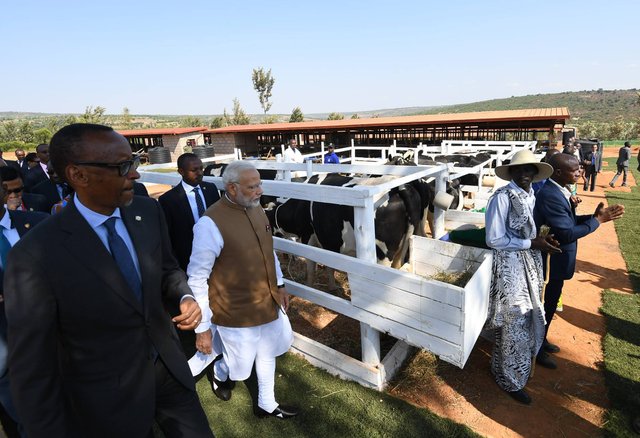Why India has gifted 200 cows to Rwanda?
Why India has gifted 200 cows to Rwanda?
• Prime Minister Narendra Modi has gifted 200 cows to Rwanda during his historic visit to the East African nation.
• Gifting bovines at the Rweru Model Village is an important part of PM Modi’s programme in Rwanda and India’s contribution to the host country’s popular ‘Girinka’ scheme.
Girinka
• ‘Girinka’ (one cow per poor family program) is a social security scheme personally overseen by Rwandan President Paul Kagame.
• It is an interesting scheme that even India can implement to improve economic condition of poorest families and farmers.
• Under Girinika scheme, the Rwandan government gifts dairy cows to poorest families and the first female calf born to the cow is gifted to the neighbour, which helps promote brotherhood and solidarity.
• According to the Ministry of Agriculture and Animal Resources, Republic of Rwanda, the scheme was launched to reduce child malnutrition rate and increase household incomes of poor farmers.
Details:
• The goals are directly achieved through increased access to, and consumption of milk, by providing poor households with a heifer.
• The program is crucial to addressing the fundamental needs of those parts of the country that are critically food insecure.
• One Cow brings nutrition, sustenance and employment, providing a stable income for a family and is a source of soil nutrients via manure to assist small scale cropping activity.
• According to the official data, so far over 203,000 families have benefited from Girinka program.
Other details:
• PM Modi is the first Indian prime minister to visit the East African nation, which is considered an important gateway for India to eastern Africa.
• During the visit, PM Modi concluded agreements in the areas of defence, dairy cooperation, leather, agriculture and culture.
• Rwanda is one of the fastest growing economies in Africa.
• India will soon open a mission in Rwanda. During this visit, two lines of credit are expected to be concluded— one of USD 100 million for development of industrial parks and Kigali special economic zone (SEZ), and another one for USD 100 million for agriculture and irrigation
